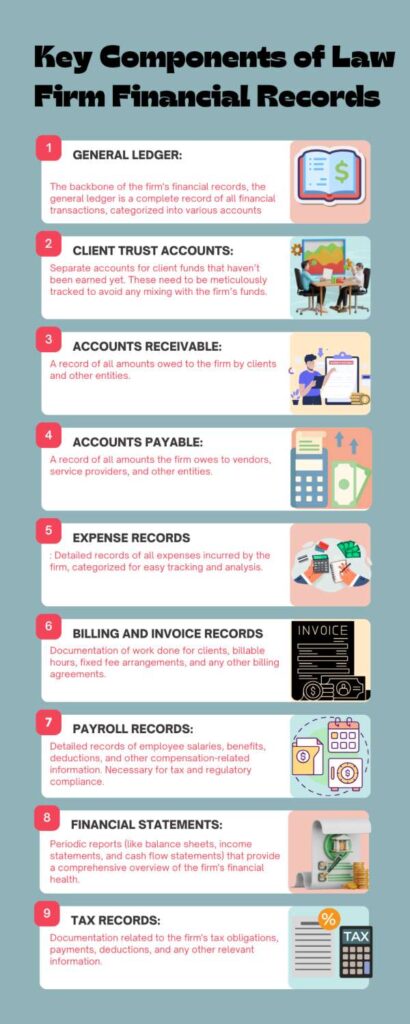
How to Do Law Firm Bookkeeping? What Are Its Rules – Papillon House

Law firms are subject to unique bookkeeping mandates that reflect the nuanced relationship between attorneys and their clients, particularly regarding client funds management.
Introduction to Law Firm Bookkeeping. Effective bookkeeping goes beyond mere compliance; it’s about stewarding client resources with the utmost integrity and ensuring the financial health of your firm.
Understanding Bookkeeping and Importance of Bookkeeping for Law Firms
Bookkeeping is the systematic process of recording, categorizing, and maintaining financial transactions. In the context of a law firm, bookkeeping not only ensures the financial health and viability of the practice but also ensures compliance with various legal and ethical standards set forth by legal bodies and regulatory agencies.
Thorough financial record-keeping is not just good practice—it’s a regulatory requirement. Proper bookkeeping ensures transparency, fosters trust, and ultimately upholds the profession’s ethical standards.
Unlike traditional businesses, law firms have certain unique financial and ethical requirements, especially when it comes to handling client funds. Law firm bookkeeping, therefore, often demands a higher degree of precision and a keen understanding of both financial and legal obligations.
The Importance of Accurate Bookkeeping in Legal Practices
Accurate bookkeeping is the lifeline of any business, but in legal practices, its importance is magnified due to stringent ethical and legal obligations. Here’s a closer look at why precision in financial record-keeping is particularly critical for law firms:
Upholding Ethical Standards: The legal profession is bound by strict ethical guidelines, especially when handling client funds. Inaccurate bookkeeping can lead to co-mingling of firm and client funds, unintentional misuse of client money, or failure to promptly disburse funds when required.
Financial Health of the Firm: Proper bookkeeping provides a clear snapshot of the firm’s financial health.
Streamlined Operations: Efficient bookkeeping means timely invoicing and faster payment cycles.
Regulatory Compliance: Law firms are often subject to various regulations, including tax obligations. Accurate bookkeeping ensures that the firm is compliant with all its financial reporting requirements and can avoid penalties, interest, or legal actions due to non-compliance.
Trust and Reputation: Clients trust law firms with their most sensitive issues. A firm that maintains accurate financial records and transparent transactions is likely to develop greater trust and confidence among its clientele.
Risk Mitigation: Proper bookkeeping helps identify irregularities, potential fraud, or embezzlement.
Understanding the Basics: Cash vs. Accrual Accounting
In managing a law firm’s money, it’s crucial to get how cash and accrual accounting work. Let’s take a look at these two key ways of tracking money to see which might be best for lawyers and their practices.
Cash-Based Accounting
Definition: In the cash-based accounting method, revenue and expenses are recorded only when cash changes hands. In other words, revenue is recognized when it’s received, and expenses are recognized when they’re paid.
| Pros: | Cons |
| Simplicity: Easier to understand and maintain, especially for smaller firms. | Doesn’t capture outstanding liabilities or receivables: It might not provide a comprehensive picture of the firm’s financial health. |
| Direct cash flow reflection: It offers a clear view of how much cash the firm has at any given time. | Less accepted for larger entities: Not always in line with Generally Accepted Accounting Principles (GAAP). |
Accrual-Based Accounting
Definition: With accrual accounting, revenue and expenses are recorded when they are earned or incurred, regardless of when the cash is actually received or paid.
| Pros: | Cons |
| Comprehensive: Provides a more accurate and holistic view of a firm’s financial health. | Complexity: Requires more meticulous bookkeeping and understanding of accounting principles |
| In line with GAAP: More widely accepted for larger firms and those with complex financial transactions. | Might not reflect cash on hand: Just because revenue is recognized doesn’t mean cash has been received |

Key Components of Law Firm Financial Records
When managing a law firm’s finances, certain records are essential to keep everything running smoothly and compliantly. Here are the essential components:
General Ledger: The backbone of the firm’s financial records, the general ledger is a complete record of all financial transactions, categorized into various accounts.
Client Trust Accounts: Separate accounts for client funds that haven’t been earned yet. These need to be meticulously tracked to avoid any mixing with the firm’s funds.
Accounts Receivable: A record of all amounts owed to the firm by clients and other entities.
Accounts Payable: A record of all amounts the firm owes to vendors, service providers, and other entities.
Expense Records: Detailed records of all expenses incurred by the firm, categorized for easy tracking and analysis.
Billing and Invoice Records: Documentation of work done for clients, billable hours, fixed fee arrangements, and any other billing agreements.
Payroll Records: Detailed records of employee salaries, benefits, deductions, and other compensation-related information. Necessary for tax and regulatory compliance.
Bank Reconciliation Statements: Periodic checks to ensure that the firm’s bank account balances match the figures in the bookkeeping system.
Financial Statements: Periodic reports (like balance sheets, income statements, and cash flow statements) that provide a comprehensive overview of the firm’s financial health.
Tax Records: Documentation related to the firm’s tax obligations, payments, deductions, and any other relevant information.
Client Trust Accounts: Managing and Monitoring
Client trust accounts, often referred to as IOLTA (Interest on Lawyers’ Trust Accounts) in some jurisdictions, are essential instruments for law firms. These accounts hold client funds separately from the firm’s operational accounts to ensure there’s no co-mingling of client money with firm money.
Setting Up the Account
Segregation of Funds: Trust accounts must be separate from the firm’s operational accounts. Ensure that client funds are never deposited into the firm’s general account.
Interest-Bearing Accounts: In many jurisdictions, trust accounts must be interest-bearing, with the interest accrued used to support legal aid initiatives.
Bank Selection: Choose a bank familiar with trust account requirements to ensure compliance with local regulations.
Managing the Account
Deposits: Always obtain detailed deposit slips that clearly specify the client and matter related to each deposit.
Withdrawals: Withdrawals should only be made after earning the funds (i.e., after billing the client and performing the services). Always use checks or electronic transfers, avoiding cash withdrawals.
Third-Party Payments: In situations where the firm needs to pay third parties from the trust account on behalf of the client, ensure documentation of client authorization.
Monitoring and Reconciliation
Monthly Reconciliation: Match the bank statement with the trust ledger every month to identify discrepancies.
Client Sub-Ledgers: Maintain individual ledgers for each client to track their specific deposits and withdrawals.
Regular Audits: Periodically, conduct internal or external audits of the trust account to ensure everything is in order.
Ethical Considerations
Prompt Payment: If funds belong to the client (like settlements), they must be disbursed promptly.
Overdrafts: Never use one client’s funds to cover another client’s expenses.
Disputed Amounts: If there’s a dispute over a certain amount, it should remain in the trust account until the dispute is resolved.
Expense Tracking for Law Firms: What to Consider
Expense tracking is a vital activity for law firms, ensuring financial stability and compliance with legal accounting standards. When it comes to managing and recording expenses, law firms should consider the following elements to maintain an accurate and effective bookkeeping system:
Categorizing Expenses
Direct Costs: Costs related directly to client work, like court fees, expert witness fees, and deposition costs.
Operational Costs: General costs of running the firm, including rent, utilities, software subscriptions, and salaries.
Marketing and Business Development: Costs related to advertising, seminars, client entertainment, and other promotional activities.
Expense Allocation
Client-Billable Expenses: Direct costs that will be billed to the client. Ensure these are accurately tracked and itemized on invoices.
Firm-Borne Expenses: Costs the firm absorbs as part of doing business. While not billable, tracking these helps in budgeting and financial planning.
Documenting and Approving Expenses
Receipts: Always collect and store receipts for expenses. Digital storage solutions can help manage and retrieve them easily.
Approval Process: Implement an approval process for larger expenses to ensure they’re necessary and aligned with the firm’s goals.
Expense Reporting: Use software or manual logs to regularly report and review expenses.
Budgeting and Analysis
Annual Budgeting: Based on past expenses, set a budget for the upcoming year, considering potential changes like expansion or increased marketing efforts.
Regular Review: Periodically review expenses against the budget to ensure the firm stays on track. Analyze any significant overruns or under-spends.
Expense Ratios: Compare expenses to revenues to understand the firm’s profitability and make necessary adjustments.
Recording Billable Hours and Invoice Management
Recording billable hours accurately and managing invoices efficiently are critical to the financial success and credibility of a law firm. Here’s a systematic approach to ensure these processes are handled effectively:
Recording Billable Hours
Time Tracking Tools: Implement user-friendly time tracking software or apps that allow attorneys and staff to log hours in real-time.
Standardized Time Increments: Establish whether the firm will bill in six-minute increments (common in the industry) or another interval.
Descriptive Entries: When logging hours, ensure descriptions are clear and detailed enough for clients to understand the work done but without revealing confidential information.
Non-Billable Hours: Track non-billable hours (administrative tasks, internal meetings, etc.) as well to understand productivity and firm efficiency.
Regular Time Entry: Encourage attorneys and staff to record hours daily or at least weekly to ensure accuracy and reduce the likelihood of forgetting tasks.
Invoice Management
Invoice Generation: Use accounting or practice management software to generate invoices based on logged billable hours and fixed fees.
Itemized Breakdown: Ensure invoices provide an itemized list of services rendered, along with respective costs and total hours worked.
Disbursements & Expenses: Include any client-billable disbursements or expenses, ensuring they’re clearly differentiated from hourly charges.
Payment Terms: Clearly indicate payment terms (e.g., due upon receipt, net 30 days) and any late payment penalties.
Electronic Invoicing: Consider offering electronic invoicing for convenience and quicker payments. Include various payment options for clients.
Invoice Tracking: Monitor unpaid invoices, sending reminders as needed, and consider implementing an automated system for follow-ups.
Allocating Income: Partners, Associates, and Overheads Partners
Allocating income within a law firm isn’t just about numbers and percentages; it’s about recognizing the hard work and dedication of every individual who contributes to the firm’s success. From the seasoned partners to the diligent associates whose efforts keep the gears turning, and the support staff who ensure the day-to-day operations run smoothly – each plays a pivotal role.
Here’s how a law firm can thoughtfully and fairly distribute income, ensuring that everyone’s contribution is valued and the firm’s foundations remain strong.
Equity Partners: Their income is typically derived from the firm’s profits.
Salary Plus Bonus: Some partners may receive a fixed salary plus a bonus based on performance, origination, or other criteria.
Capital Contributions: Consider any capital a partner has injected into the firm, which might affect their income distribution.
Associates
Fixed Salary: Most associates receive a fixed annual salary, which might be tiered based on years of experience or expertise.
Performance Bonuses: Bonuses can be awarded based on billable hours, business generation, client feedback, or other performance indicators.
Overheads
Regular Expenses: Deduct regular operational expenses such as rent, utilities, salaries of non-legal staff, and general office expenses.
One-off Expenses: Account for irregular or one-time expenses such as new equipment purchases, office renovations, or settlements in legal disputes.
Reserves: Allocate a portion of income to reserves for future expenses, potential downturns, or expansion plans.
Distribution Timing
Frequency: Decide on the frequency of income distribution – monthly, quarterly, semi-annually, or annually.
Holding Periods: Consider any holding periods for income to ensure the firm maintains adequate liquidity for operational needs.
Transparency & Communication
Open Books: Consider an open-book policy where partners (and possibly senior associates) can view the firm’s financials to understand income allocation.
Regular Financial Meetings: Hold regular meetings to discuss the firm’s financial status, upcoming expenses, and income allocation decisions.
The Role of Legal Accounting Software
Modern law firms depend on legal accounting software to guide their financial journey. This technology isn’t merely a tool; it becomes a member of the team, working around the clock, safeguarding the firm’s financial integrity, and shining a light on the path to fiscal responsibility
Streamlining Financial Processes
Automation: Legal accounting software often automates routine tasks like invoice generation, expense tracking, and financial report compilation, saving time and reducing manual errors.
Integration with Time Tracking: Most legal-specific accounting software integrates seamlessly with time tracking tools, ensuring accurate billing.
Trust Account Management
Ethical Compliance: Given the sensitivity of client trust accounts, specialized software ensures ethical rules are adhered to, helping prevent unintentional co-mingling of funds.
Automated Reconciliation: Software can simplify the monthly reconciliation process, matching transactions with bank statements and highlighting discrepancies.
Detailed Reporting
Financial Overviews: Generate comprehensive financial reports, like profit and loss statements or balance sheets, with just a few clicks.
Client-Specific Reports: Obtain detailed financial histories for individual clients, useful for understanding client relationships and payment behaviors.
Secure Data Storage
Cloud-based Solutions: Many legal accounting software options are cloud-based, allowing for secure data storage, regular backups, and remote access.
Encryption: Client data and financial transactions are encrypted, ensuring protection from potential breaches.
Scalability
Growth Support: As a law firm grows, so do its accounting needs. Legal accounting software can scale to support multiple users, larger volumes of data, and complex financial operations.
Understanding Tax Obligations for Law Firms
Business Structure Implications
Sole Proprietorship: Income and expenses are typically reported on the individual’s tax return. The owner pays personal income tax on the firm’s profits.
Partnerships: Profits and losses flow through to the individual partners, who report them on their personal tax returns. Each partner’s share is determined by the partnership agreement.
Corporations: The firm may be taxed at the corporate rate, and shareholders (often attorneys) pay individual taxes on dividends or salaries received.
Deductible Expenses
Ordinary and Necessary: Only expenses that are both ordinary (common in the legal profession) and necessary (helpful for the business) are deductible.
Examples: Office rent, utilities, salaries, continuing legal education, bar dues, and legal subscriptions are generally deductible.
Employment Taxes
Payroll Taxes: If the firm has employees, it’s responsible for withholding federal income tax and FICA (Social Security and Medicare) taxes from their wages.
Self-Employment Taxes: Sole proprietors and partners in a partnership must pay self-employment taxes, which cover Social Security and Medicare.
Quarterly Estimated Payments
For Self-Employed Attorneys: If the firm doesn’t withhold taxes for you (common for partners and solo practitioners), you’ll likely need to make quarterly estimated tax payments to the IRS.
Penalties: Failing to make sufficient estimated payments can result in penalties, even if you pay the full amount owed by the tax filing deadline.
Record-Keeping
Maintain Comprehensive Records: Keep detailed records of income, expenses, and deductions to make tax preparation easier and ensure compliance.
Retention: Tax records should be retained for a minimum period specified by tax authorities (often 3-7 years), as they may be required in the event of an audit.

Ethical Considerations in Law Firm Bookkeeping
Ethical considerations in law firm bookkeeping go beyond mere compliance with constitutional regulations; they highlight the firm’s commitment to integrity and trust. As custodians of sensitive financial information and client funds, law firms must navigate a landscape where every financial entry speaks to their adherence to the highest standards of professional conduct.
Handling Client Funds
Segregation of Funds: Always separate client funds from the firm’s operating funds to avoid co-mingling.
Immediate Deposit: Upon receipt, deposit client funds into the appropriate trust or IOLTA account without delay.
Unauthorized Withdrawals: Never make withdrawals from a client trust account without proper authorization or justification.
Transparency with Clients
Clear Invoicing: Always provide detailed and transparent invoices, explaining all charges and their justification.
Prompt Communication: Inform clients promptly of any financial matters related to their case, such as expenses incurred or funds received on their behalf.
Accurate Record Keeping
Maintain Comprehensive Records: Always keep detailed records of financial transactions, particularly those related to client funds.
Regular Reconciliation: Regularly reconcile bookkeeping records with bank statements to ensure accuracy and catch potential discrepancies.
Conflicts of Interest
Financial Interests: Be wary of any financial relationships or interests that could create a conflict of interest in representation, and disclose any potential conflicts to clients.
Responsibility and Oversight
Accountability: Even if a non-lawyer handles the firm’s bookkeeping, the attorneys are ultimately responsible for ensuring ethical compliance.
Training: Ensure that anyone handling the firm’s financial transactions is trained on the ethical considerations specific to legal practices.
Common Mistakes in Legal Bookkeeping and How to Solve Them
Neglecting Regular Reconciliation
| Mistake | Solution |
| Failing to reconcile the firm’s accounts regularly, leading to undetected errors or discrepancies | Commit to monthly reconciliations, comparing bookkeeping records to bank statements, and addressing any anomalies immediately. |
Poor Management of Client Trust Accounts
| Mistake | Solution |
| Co-mingling client funds with operational funds or making unauthorized withdrawals. | Use legal-specific accounting software that supports trust account management and always treat client funds with utmost care. |
Not Tracking Non-Billable Time
| Mistake | Solution |
| Only tracking billable hours and ignoring non-billable time, which can provide insights into firm productivity and efficiency. | Implement comprehensive time-tracking for all tasks, billable or not. |
Lack of Backup and Data Security
| Mistake | Solution |
| Failing to back up financial data or not securing sensitive information, leading to potential data loss or breaches. | Use cloud-based accounting software with automatic backups and robust encryption. Regularly review and update security protocols. |
Inaccurate or Delayed Invoicing
| Mistake | Solution |
| Sending out invoices with errors or delays, leading to cash flow issues or disputes with clients. | Establish a routine billing cycle, use automated invoicing tools, and review invoices for accuracy before dispatching. |
Failure to Stay Updated on Tax Obligations
| Mistake | Solution |
| Overlooking updates in tax codes or obligations, leading to potential penalties or missed deductions. | Continually educate yourself on tax changes, consult with a tax professional regularly, and utilize software that updates tax codes automatically. |
Unlock Your Law Firm’s Potential with Precision Bookkeeping
Are you shouldering the weight of financial compliance and bookkeeping on your own? It’s time to shed the burden and step into a realm where clarity meets compliance, and financial statements become your strategic advantage.
At Papillon House, we specialize in transforming your financial processes from a foggy maze into a clear path towards growth and success.
Our suite of services is not a one-size-fits-all solution—it’s a bespoke suit tailored to your firm’s unique financial heartbeat. From QuickBooks Cleanups that streamline your processes to Profit & Loss Statements that illuminate your financial health, we are the guardians of your financial peace.
Act now to secure your firm’s future. Embrace the gold standard of bookkeeping excellence with Papillon House. Schedule your consultation today and take the first step towards financial empowerment.
Frequently Asked Questions
What are the specific bookkeeping rules that law firms need to follow?
Law firms must adhere to:
- General accounting principles and local tax laws.
- Ethical rules regarding client funds, often governed by state bar associations.
- IOLTA (Interest on Lawyer Trust Accounts) guidelines for handling client funds.
- Record-keeping rules that may dictate how long and in what format records must be kept.
How does a law firm’s bookkeeping differ from other businesses?
Law firm bookkeeping is unique due to:
- The management of client trust accounts.
- The need to track billable hours alongside expenses.
- The ethical obligations regarding the handling of client funds.
- Specific revenue recognition rules when dealing with retainer fees and contingency cases.
What kind of records are law firms required to keep for compliance?
Law firms need to maintain:
- Detailed client ledgers.
- Bank statements for all firm accounts, including trust accounts.
- Receipts for expenses.
- Timekeeping records for billable hours.
- Invoices and billing records.
- Tax filings and related documents.
How should a law firm manage client trust accounts according to bookkeeping rules?
Client trust accounts should be managed by:
- Keeping them completely separate from the firm’s operating accounts.
- Depositing all client funds promptly.
- Using accounting software or methods that can track individual client balances.
- Writing checks directly from the trust account for client-related expenses.
- Regularly auditing and reconciling these accounts.
Are there any software solutions recommended for law firm bookkeeping?
There are several legal-specific accounting software solutions like Clio Manage, QuickBooks for Law Firms, and Zola Suite that are well-suited for law firm bookkeeping. These platforms cater to the unique needs of legal bookkeeping, including client trust accounting, time tracking, and billing.
What is IOLTA, and how does it affect bookkeeping practices for law firms?
IOLTA stands for “Interest on Lawyer Trust Accounts.” It’s a program that pools interest from client trust accounts and uses it to fund legal aid for the underserved. For bookkeeping, this means law firms must track these funds accurately and cannot earn interest on client funds for their own profit.
What are the consequences of poor bookkeeping practices for a law firm?
Poor bookkeeping can lead to ethical violations, financial mismanagement, damaged client relationships, regulatory penalties, and in severe cases, disbarment for attorneys.
About Morgan

Morgan is the Director at Papillon House Bookkeeping, a Tampa, Florida-based firm that specializes in bookkeeping services for law offices, architects, and the construction industry. With over three years of experience in her current role, she aids her clients in meticulously organizing their financials. Morgan's dedication and expertise extend beyond the realm of accounting, allowing her to provide comprehensive financial management solutions. She also engages with her audience through live discussions on the Papillon House Bookkeeping Facebook group page.




